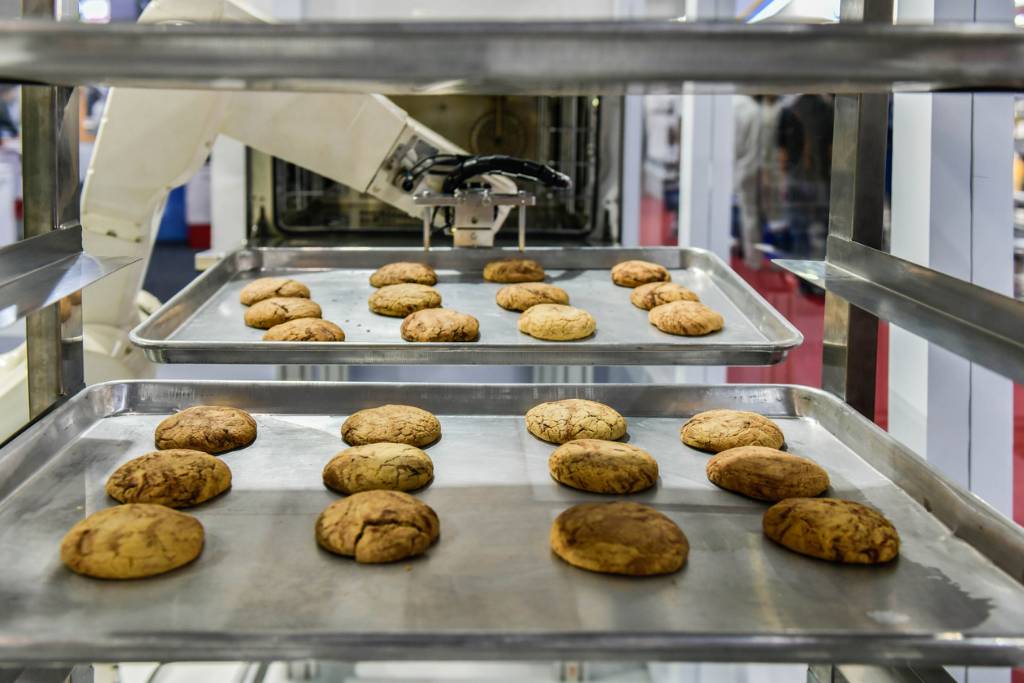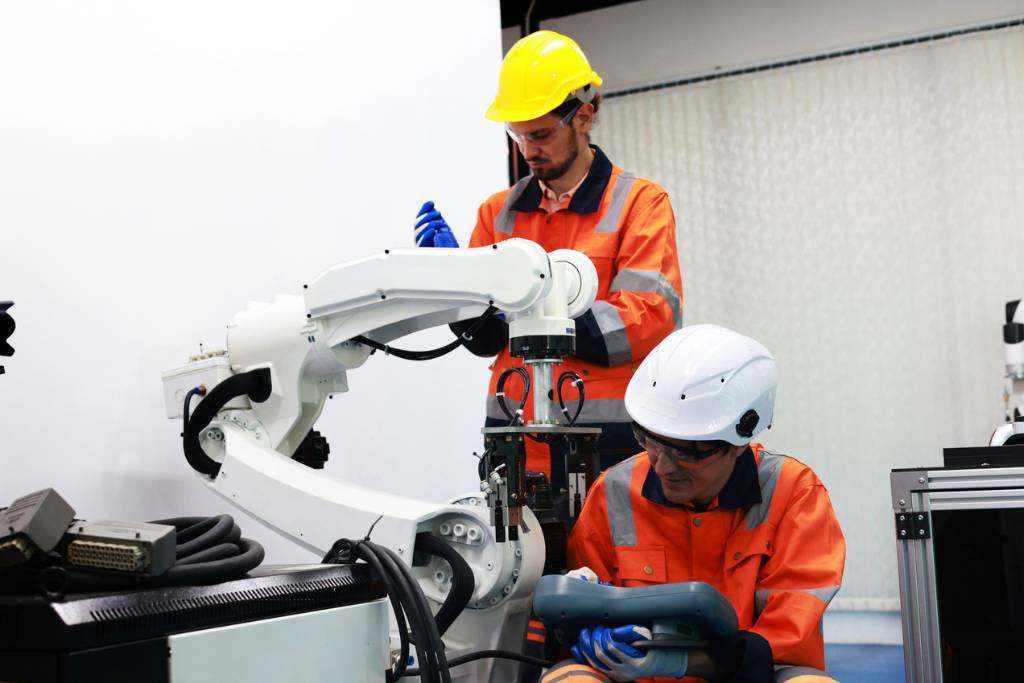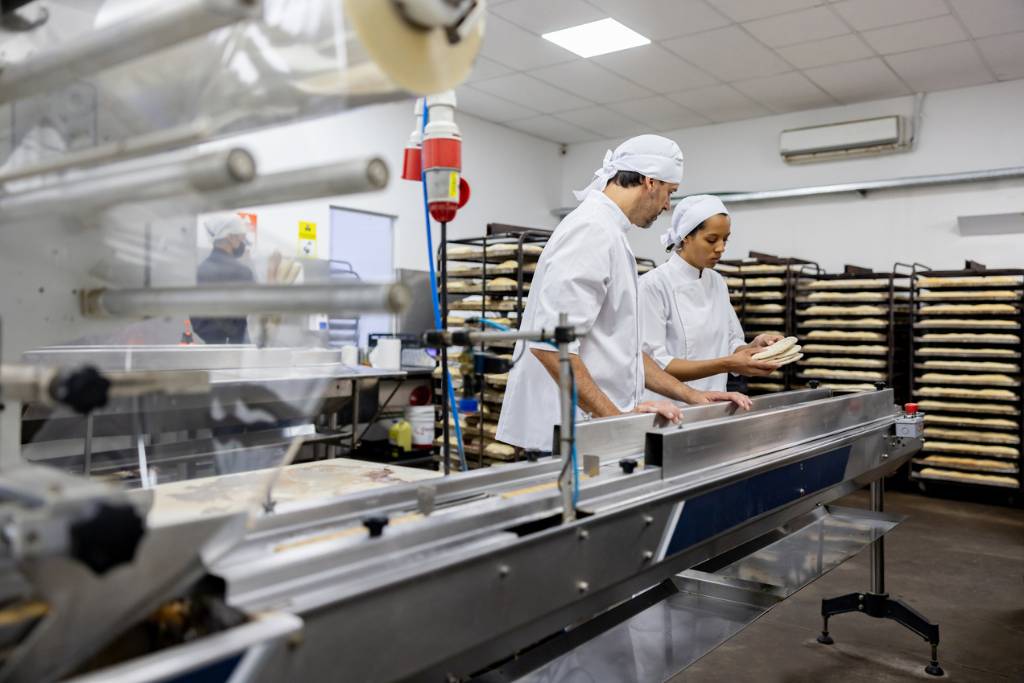Automated systems and indeed robotics are disrupting the baking and food production industries the world over – but are they a blessing or a curse for your business productivity and profits?
There’s no doubt that using these systems has many advantages – boosting production efficiency, consistent product quality and reducing costs, to name just a few. But there are also many disadvantages, not least the loss of manual jobs and disruption to a production line when technology inevitably (at some point) breaks down.
Read on as we discuss the infinite possibilities of using automated systems for the baking and food production industries – and the indisputable downsides – and why at Schaumburg Specialties, we believe that our premium quality equipment and metal fabrication expertise, working in partnership with automation, is the key to improving productivity and profits for all our clients.
The Benefits Of Automated Systems
Increased Efficiency and Productivity
Automated systems can inevitably operate at higher speeds than manual laborers, significantly increasing the rate of production. They can also run continuously without the need for breaks, leading to higher output.
Reduced Costs
Labor costs are inevitably reduced when using automated systems because there’s less need for manual labor. Product waste is also minimized because ingredients are measured precisely and production is consistent.
Energy costs too are reduced, because automated systems can optimize baking times and temperatures, leading to energy savings.
Consistent Quality
Automation ensures that each product is made to the same specifications, maintaining consistent quality and appearance. It can also measure ingredients and control baking and food production conditions with high accuracy, reducing the chances of human error.
Adaptability & Scalability
The technology of automated systems can easily be adapted to produce different products or to change production volumes. This helps hugely with scalability, meaning production can easily be ramped up to meet increased demand at certain times of year such as Thanksgiving and Christmas.
It could also give your business a competitive edge, allowing you to produce a larger volume of high quality goods at a lower cost
Enhanced Food Safety
Hygiene security is a big deal when you’re in the bakery and foodservice industries. Automation can help lower the risk of contamination by minimizing human contact with food products, as well as track ingredients and production processes, thereby improving traceability and food safety compliance.
Better Work Opportunities & Conditions
The ever increasing use of automated systems could lead to great new training opportunities for existing employees, as well as better working opportunities for college leavers as more jobs and careers in automation and robotics (as programmers or technicians, for example) become available.
Automation also reduces the need for physically demanding and repetitive tasks and the need for humans to work in hazardous conditions such as in high temperatures or with heavy machinery.
As we’ve seen, there are many benefits of using automated systems in the bakery and foodservice industries – but there are a number of drawbacks too. Read on to discover what these are.
The Disadvantages Of Automated Systems
High Costs
The initial costs involved with purchasing, installing and integrating automated systems into your working operations, as well as retraining staff, can be very high and a significant investment for small and medium-sized businesses. Ongoing maintenance and repair costs can also be substantial.
Job Displacement
Automation can lead to job losses, particularly for roles that involve repetitive manual tasks. This can of course affect the labor market and local economies and lead to some dissatisfaction among employees and local communities, many of which rely on manual labor jobs for their livelihoods.
System Failure & Breakdown
Automated systems will inevitably experience technical issues or breakdowns, leading to disruption, downtime while repairs are carried out. The knock effect is delays in production and an associated loss of profits.
Technological Expertise Required
Operating and maintaining automated systems requires specialized knowledge and training, which can be a very real barrier for many businesses, with a lot of costs involved in hiring technicians or retraining staff.
Quality Control Issues
Bakeries and food production businesses can become heavily reliant on the automated systems, meaning there’s less human oversight which could lead to issues with product quality being overlooked.
Reduced Flexibility
Automated systems may struggle with producing small batches or highly customized products, while adapting the systems to produce new products or alter recipes can be time-consuming and expensive.
Working In Partnership With Automated Systems
We’ve seen both the enormous benefits and disadvantages that automated systems can bring to the food production and baking industries – and to your business. So what’s the answer?
At Schaumburg Specialties we believe the answer lies in working in partnership with automation and robotics to improve efficiency, productivity, adaptability and food and workplace safety for all our clients. For an example, read this automated-enabled rack for a bakery case study where we built custom sheet pan racks that would synchronize and work perfectly with their RoboTray system.
We’ve been providing premium quality, expertly fabricated food production equipment to America’s bakery, food processing and food service industries for over 40 years. We are always on the lookout for ways to improve and enhance our offerings to our valued clients and that includes staying ahead of the curve when it comes to technological advances.
We believe that our iconic equipment and fabrication expertise, working alongside automation and robotic technologies can work wonders for the production efficiency of our customers across America. Get in touch with our team today to learn more and see how we can help.


